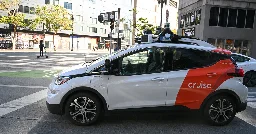Driverless Taxis Blocked Ambulance in Fatal Accident, San Francisco Fire Dept. Says
Driverless Taxis Blocked Ambulance in Fatal Accident, San Francisco Fire Dept. Says

www.nytimes.com
Driverless Taxis Blocked Ambulance in Fatal Accident, San Francisco Fire Dept. Says

Two Cruise driverless taxis blocked an ambulance carrying a critically injured patient who later died at a hospital, a San Francisco Fire Department report said, in another incident involving self-driving cars in the city.
On Aug. 14, two Cruise autonomous vehicles were stopped in the right two lanes of a four-lane, one-way street in the SoMa neighborhood, where the victim was found, according to the department report. It said that a police vehicle in another lane had to be moved in order for the ambulance to leave.
